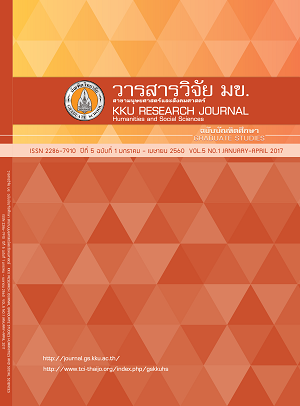การสำรวจค่านิยมของนักเรียนในระดับชั้นประถมศึกษาปีที่ 5 เกี่ยวกับการเรียนคณิตศาสตร์โดยใช้วิธีการแบบเปิดของญี่ปุ่น
Abstract
การวิจัยครั้งนี้มีวัตถุประสงค์เพื่อสำรวจค่านิยมของนักเรียนเกี่ยวกับการเรียนคณิตศาสตร์ โดยมีกลุ่มตัวอย่างเป็นนักเรียนระดับชั้นประถมศึกษาปีที่ 5 ภาคต้น ปีการศึกษา 2558 จำนวน 73 คน กลุ่มตัวอย่างได้เรียนวิชาคณิตศาสตร์ในห้องเรียนที่ใช้วิธีการแบบเปิด (Open Approach) ซึ่งเป็นวิธีการที่เน้นให้นักเรียนแก้ปัญหาด้วยตนเองเป็นระยะเวลา 1 ภาคการศึกษา โดยเป็นแนวคิดในการจัดการเรียนการสอนที่พัฒนาจากประเทศญี่ปุ่น เครื่องมือที่ใช้ในการวิจัยคือ แบบสำรวจค่านิยมของนักเรียนเกี่ยวกับการเรียนคณิตศาสตร์ที่แบ่งระดับความคิดเห็นออกเป็น 5 ระดับ วิเคราะห์ข้อมูลโดยสถิติพื้นฐาน ได้แก่ ค่าเฉลี่ย (Means) และส่วนเบี่ยงเบนมาตรฐาน (Standard Deviation) ผลการวิจัยพบว่า นักเรียนมีค่านิยมเกี่ยวกับการเรียนคณิตศาสตร์ที่มีระดับสูงที่สุด เรียงลำดับตามค่าเฉลี่ยจากสูงไปต่ำ 5 อันดับแรก ดังนี้ 1) ให้ความสำคัญกับการได้คำตอบที่ถูกต้อง ( = 4.59) 2) ให้ความสำคัญกับการเชื่อมโยงคณิตศาสตร์กับชีวิตจริง และ การฝึกวิธีการใช้สูตรทางคณิตศาสตร์ ( = 4.51) 3) ให้ความสำคัญกับการท่องจำกฎ สูตร ข้อเท็จจริงต่างๆ และ การใช้สื่อรูปธรรมเพื่อให้เข้าใจคณิตศาสตร์ ( = 4.49) 4) ให้ความสำคัญกับเรื่องเกี่ยวกับการพัฒนาคณิตศาสตร์ในปัจจุบัน และความทรงจำเกี่ยวกับงานคณิตศาสตร์ที่เคยทำ ( = 4.48) และ 5) ให้ความสำคัญกับการแก้ปัญหาคณิตศาสตร์ ( = 4.47) ส่วนค่านิยมเกี่ยวกับการเรียนคณิตศาสตร์ของนักเรียนที่มีค่าเฉลี่ยต่ำสุด 5 อันดับ ดังนี้ 1) ให้ความสำคัญกับการที่ครูให้ความช่วยเหลือในการเรียนเป็นการส่วนตัว ( = 3.90) 2) ให้ความสำคัญกับการใช้เครื่องคิดเลขในการตรวจสอบคำตอบ ( = 3.56) 3)ให้ความสำคัญกับการเห็นว่าคณิตศาสตร์มีความสวยงาม ( = 3.55) 4) ให้ความสำคัญกับการบ้านวิชาคณิตศาสตร์ ( = 3.37) และ 5) ให้ความสำคัญกับการใช้เครื่องคิดเลขในการคำนวณ ( = 3.08)
ABSTRACT
This study aimed to explore students’ values about learning mathematics. The targets groups was 73, fifth grade students in the first semester of 2015 academic year, who studying mathematics in the classroom using Japanese Open Approach. This approach is a method that focused on Problem Solving by themselves for a period of one semester. Data collected by using questionnaire. The opinions were divided into five levels, analyzed using descriptive statistics, including means ( ) and standard deviation (S.D.). The research found that students’ values about learning mathematics at average of high-to-low were as the following: 1) getting the right answer ( = 4.59) 2) connecting maths to real life and practising how to use maths formulae ( = 4.51) 3) memorising facts and using concrete materials to understand mathematics ( = 4.49) 4) stories about recent developments in mathematics and remembering the work we have done ( = 4.48) and 5) problem-solving ( = 4.47). The Students’ Values about Learning Mathematics with the lowest average as follows: 1) teacher helping me individually ( = 3.90) 2) using the calculator to check the answer ( = 3.56) 3) appreciating the beauty of maths ( = 3.55) 4) mathematics homework. ( = 3.37), and 5) using the calculator to calculate ( = 3.08).



